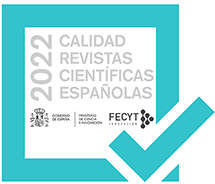Diseño y aplicación de un programa de intervención de práctica deportiva inclusiva y su efecto sobre la actitud hacia la discapacidad: El Campus Inclusivo de Baloncesto. (Design and implementation of an intervention program of inclusive sport and its effect on attitudes toward disability: The Inclusive Basketball Campus).
Resumen
El objetivo del presente estudio fue diseñar y aplicar un programa de intervención como modelo de práctica deportiva inclusiva, analizando el impacto que ejerce en la actitud hacia la discapacidad en chicos que no la tienen. Para ello, se puso en práctica el “Campus Inclusivo de Baloncesto”, organizado por la Fundación Real Madrid, como actividad deportiva inclusiva donde la práctica del baloncesto sirve de contexto para una práctica normalizadora, ya que a él asisten participantes con y sin discapacidad física. El diseño del estudio fue de tipo experimental, utilizando el "Cuestionario de actitudes hacia las personas con discapacidad" (Reina, López, Jiménez, García-Calvo, y Hutzler, 2011) aplicándolo antes de la intervención, después y pasados 9 meses de la misma, a los 21 participantes sin discapacidad (17 hombres y 4 mujeres), con edades comprendidas entre los 8 y los 14 años. Se aplicó la prueba de Wilcoxon y ANOVA de medidas repetidas, estableciendo el nivel de confianza en p≤0,05. Los resultados muestran que se registran cambios significativos en positivo tras la actividad a favor de la actitud hacia las personas con discapacidad, además de mantenerse dichos cambios en el tiempo. Por tanto, podemos afirmar que el diseño propuesto, llevado a cabo en este Campus Inclusivo de Baloncesto, se muestra eficaz a la hora de favorecer los beneficios de la inclusión en contextos de iniciación deportiva.
Abstract
The aim of this study was to design and to implement an intervention program as a model of inclusive sport, analyzing its impact on the attitude towards disability in children who have no disability. For this purpose, was implemented the "Inclusive Basketball Campus", organized by the Real Madrid Foundation, where basketball as inclusive sport provides a context for normalizing practice, since to this activity is attended by participants with and without physical disabilities. The study design was experimental, using the "Survey of attitudes towards people with disabilities" (Reina, López, Jiménez, García-Calvo, & Hutzler, 2011) applying before intervention, just after intervention and 9 months later on a sample of 21 participants without disabilities (17 males and 4 females) aged between 8 and 14 were studied. Wilcoxon and ANOVA´s repeated test was applied, setting the confidence level at p≤0.05. The results show that there are significant changes after the activity in positive attitude changes towards people with disabilities, and these changes keep in time. Therefore, it can be stated that the proposed design, carried out in the Inclusive Campus Basketball, shown effective in promoting the benefits of inclusion in the context of initiation to sports.
http://dx.doi.org/10.5232/ricyde2012.02905
------------------------------------------------------------------------
Referencias/references
Archie, V., & Sherrill, C. (1989). Attitudes toward handicapped peers of mainstreamed and nonmainstreamed children in physical education. Perceptual Motor Skills, 69(1), 319-322.
http://dx.doi.org/10.2466/pms.1989.69.1.319
PMid:2528719
Bergman, M., & Hanson, C. (2000). The relationship between participation in a sports camp and students' attitudes towards persons with disabilities. Occupational Therapy in Health Care, 12(4), 51-63.
http://dx.doi.org/10.1300/J003v12n04_04
Block, M., & Malloy, M. (1998). Attitudes on inclusion of a player with disabilites in a regular softball league. Mental Retardation, 36(2), 137-144.
http://dx.doi.org/10.1352/0047-6765(1998)036<0137:AOIOAP>2.0.CO;2
Hutzler, Y. (2003). Attitudes toward the Participation of Individuals with Disabilities in Physical Activity: A Review. Quest, 55(4), 347-373.
http://dx.doi.org/10.1080/00336297.2003.10491809
Jacques, N.; Wilton, K., & Townsend, M. (1998). Cooperative learning and social acceptance of children with mild intellectual disability. Journal of Intellectual Disability Research, 42(1), 29-36.
http://dx.doi.org/10.1046/j.1365-2788.1998.00098.x
PMid:9534112
Krahé, B., & Altwasser, C. (2006). Changing negative attitudes towards persons with physical disabilities: an experimental intervention. Journal of Community and Applied Social Psychology, 16(1), 59-69.
http://dx.doi.org/10.1002/casp.849
Nowicki, E. (2006). A cross-sectional multivariate analysis of children's attitudes towards disabilities. Journal of Intellectual Disability Research, 50(5), 335-348.
http://dx.doi.org/10.1111/j.1365-2788.2005.00781.x
PMid:16629927
Pernice, R., & Lys, K. (1996). Interventions for Attitude Change towards People with Disabilities: How Successful Are They? International Journal of Rehabilitation Research, 19(2), 171-174.
http://dx.doi.org/10.1097/00004356-199606000-00008
PMid:8842831
Reina, R.; López, V.; Jiménez, M.; García-Calvo, T., & Hutzler, Y. (2011). Effects of awareness interventions on children's attitudes toward peers with a visual impairment. International Journal of Rehabilitation Research, 34 (3), 243-248.
http://dx.doi.org/10.1097/MRR.0b013e3283487f49
PMid:21694601
------------------------------------------------------------------------
Palabras clave/key words
Texto completo/Full Text:
PDF------------------------ 0 -------------------------
RICYDE. Revista Internacional de Ciencias del Deporte
![]()

Publisher: Ramón Cantó Alcaraz
ISSN:1885-3137 - Periodicidad Trimestral / Quarterly

